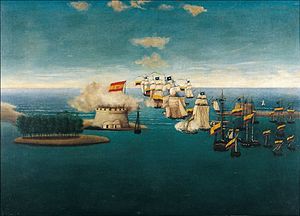Battle of Lake Maracaibo
| Battle of Lake Maracaibo | |||||||
|---|---|---|---|---|---|---|---|
| Part of Venezuelan War of Independence | |||||||
 Painting by José María Espinosa Prieto (1796-1883) |
|||||||
|
|||||||
| Belligerents | |||||||
|
|
|
||||||
| Commanders and leaders | |||||||
|
|
|
||||||
The Battle of Lake Maracaibo also known as the "Naval Battle of the Lake" was fought on 24 July 1823 on Venezuela's Lake Maracaibo between fleets under the commands of Republican Admiral José Prudencio Padilla and royalist Captain Ángel Laborde.
The engagement was won by the Republican forces, and was the last battle of the Venezuelan War of Independence and the larger Spanish American wars of independence. The Republican ships were part of the armed forces of Gran Colombia led by Simón Bolívar.
The Battle of Carabobo of 1821 is usually seen in the historiography as the culminating battle for Venezuelan independence. However, some historians point out that if the Battle of Lake Maracaibo had been a victory for the Royalist forces, the Spanish Crown might have been able to establish a new front in Western Venezuela from which to attack the Republican forces stationed in Venezuela. As a result of the defeat, the Spanish did not send any reinforcing regiments to Venezuela, and finally accepted Venezuelan independence as a result of this second decisive Republican victory, although it did not formally recognize the new nation's independence for more than a decade afterward.
24 July is a regional holiday of Zulia State in Venezuela, and as it is also the date of the birth of Simón Bolívar, is also marked as Navy Day in both Venezuela and Colombia.
During this Naval Battle, the Republican squadron was led by Admiral José Prudencio Padilla against the Royalist forces commanded by Ángel Laborde. After three brief encounters with the Spanish squadron, the Republican fleet went to the port of Moporo, where they spent the first half of July without any major activities. On 17 July Royalist commander Laborde sent to Padilla an offer of friendship which was rejected. The following days were spent in feverish war preparations as the two commanders prepared their ships, gathered supplies, and trained their crews in anticipation of the coming combat.
...
Wikipedia
